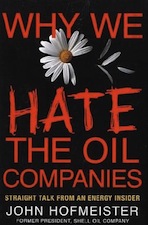Two, four, six, eight, who do we love to hate? The oil companies!

Despite my story lead, I was not a cheerleader in another life but I couldn’t get that cheer out of my head while I read this week’s book, “Why We Hate The Oil Companies Straight Talk From An Energy Insider,” by John Hofmeister. I recently gave Mr. Hofmeister some ink when he predicted that the country would see $5 per gallon of gas within the next 10 years so I thought, hey, I should read his book. See what’s he’s all about. He is, after all, the former president of Shell Oil Company.
What is Hofmeister all about? Bringing affordable, clean and sustainable energy to all Americans. He writes, “The truth is that affordable energy is essential for American economic growth. It is essential for our national security and position in world leadership. And it is necessary to maintain our quality of life.” He continues by saying affordable energy and environmental sustainability are challenges that require immediate attention.
Who is in charge of leading the way to affordable energy? The oil and utility companies? Government? American Citizens? The answer is not so black and white as Hofmeister explains. No one believes the oil companies – they are ranked 24 out of 24 in the industry “Who do you trust” poll and the government is ranked at 22. Not swell by any standards. Then we have American citizens who have been fed “information, misinformation and no information” and they are still electing politicians who have spent 40 years not making good energy policy decisions. We Americans have bad voting histories.
So what do we have? Hofmeister says “there is an energy shortage, but there is no shortage of energy.”
Like so many others, Hofmeister is not an outright fan of biofuels but he does not dismiss them entirely. He writes, “There are sound reasons for investing in biofuels research and development. We should not be naive, however, about the cost, barriers, and obstacles to commercial biofuels production. Nor should we overestimate their potential.”
He continues, “Biofuels are not about to replace classic fossil fuels as the primary source of engine power in the lifetime of anyone alive today. In fact, before we develop the capability for biofuels to replace fossil fuels, internal combustion engines will mostly disappear, and with them the need for massive quantities of biofuels.”
It just so happens that he’s banking on electric vehicles and hydrogen fuels cells as the transportation mode of the future.
That’s a good segue to briefly touch on electricity and his views on alternative energy such as solar and wind. Also, in the vain of many before him, he doesn’t believe they can compete without subsidies. In the case of wind, it doesn’t blow all the time, and for solar power, where we have ample sun, we have little water. But, like biofuels, he believes they should still be pursued.
Ultimately, Hofmeister believes that the future energy mix will still be primarily fossil fuel, or carbon based, albeit cleaner, with alternative energies filling in the gaps when needed. However, this will never happen, he says, with current policy and with all the fighting between energy industries. Therefore, his solution: “Now is the time for Congress to legislate and the president to sign a bill to create and implement an independent regulatory agency, the Federal Energy Resources System, to manage the nation’s energy and energy-related environmental footprint.”
Needless to say, this idea has gone on deaf ears in the oil and utility industries along with politicians and other energy groups. However, Hofmeister says that the general public has been receptive to the idea, and it will take a massive grassroots effort to induce major energy policy change. Therefore, he created the nonprofit Citizens for Affordable Energy to do just that.
I have read hundreds of energy and environmental books and I must say that Hofmeister has offered one of the most unique, achievable and comprehensive solutions to our energy woes that I have ever seen.

